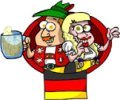Reflexive Verbs Explained
What are Reflexive Verbs?
Ever wanted to know what a verb that is reflexive does?
It's a verb where one does something to oneself.
A good reminder is to think of the things you do when you get out of bed in the morning and prepare yourself for the new day.
You get up.
Brush your teeth.
Take a shower.
Bathe yourself.
Dry yourself off.
Shave yourself.
Comb you hair (if you have some).
Brush your hair (if you have some).
Weigh oneself.
Dress yourself.
Or if you want a definition from one of those grammar books that are packed with great information but kill the ordinary learner's enthusiasm for learning languages - "reflexive verbs are verbs whose direct or indirect object is the same as their subject."**
I kick myself.
She sat herself down etc.
In European languages the word 'oneself' is called the 'reflexive pronoun'.
e.g. myself, yourself, himself, ourselves gets replaced by another word or pronoun.
Spanish Reflexives
In Spanish the infinitive of the reflexive ends in -se
acordarse - to remember (literally to agree with oneself).
peinarse - to comb one's hair.
llarmarse - to be called, named, to call oneself.
Lots and lots of verbs can be used as reflexives. By adding the -se at the end of a verb it becomes reflexive, and it often changes the meaning of the word.
For example:
The verb acordar means to agree in Spanish.
The verb acordarse means to remember - literally to agree with oneself!
The Reflexive Pronouns in Spanish are:
me - myself
te - yourself (familiar)
se - himself
nos - ourselves
os - yourselves (familiar)
se - themselves.
There is a lot more to learn about conjugating reflexive verbs in Spanish and more detail on how they work click the link.
French Reflexives
In French the infinitive of the reflexive verb begins with se.
s'appeler - to be called, named, to call oneself.
se laver - to wash oneself.
se blesser - to injure oneself.
Check out the Memory Trigger cartoon for s'appeler with our practice French sentences course.
German Reflexive Verb
In German these infinitives begin with sich. For these verbs in our German vocabulary courses we remind you of them with the picture of a Sikh man.
sich trocknen - to dry yourself.
sich erbarmen - to take pity on (easy to remember - you take pity on the SICK ER... BARMEN...)
sich erinnern - to remember.
So, there it is in a nutshell. They are very common in European languages.
**Source: French Grammar, W. Rowlinson, Oxford University Press, 2000.
200 Words a Day! Excelerated Language Learning Software - Superlearning languages the accelerated way - made easy
200 Words a Day! and Exceltra
©Copyright
2004-2023 All Rights Reserved
IMAGINE how you'd
FEEL
seeing yourself learning at a rate of 200 words a day ... the ideal companion course that complements any language course.
|










New! Comments
Have your say about what you just read! Leave us a comment in the box below.